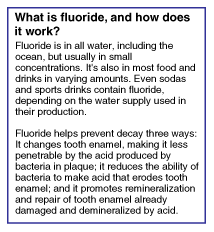Filtering Out the Fluoride
Does bottled water weaken developing teeth?
By Leah Shafer
Community water fluoridation programs are considered one of the twentieth century's great health achievements: Due to the presence of fluoride in tap water, many kids have grown up with very few cavities. A 15-year study showed that children in Grand Rapids, Michigan -- where the first fluoridation program was initiated in 1945 -- had 50-63 percent less tooth decay than kids who grew up before water fluoridation.
But these days, fewer children are drinking tap water. Bottled water, which provides convenience, taste, and the assurance that it has been filtered for impurities, is the fastest-growing beverage category in the United States. With sales in 1999 up 14 percent at $4.9 million, bottled water now makes up a significant portion of the water we drink. Around 9 percent of kids use it as their primary water source, according to one study, and many more drink substantial amounts of it. The fluoride level in most bottled water is far below optimal, however, so these children might be at greater risk for a mouthful of decay.
When kids with a lot of dental decay find their way to pediatric dentist Dr. Mary Hayes, spokesperson for the American Dental Association (ADA), she always asks if they drink unfluoridated bottled water. Getting adequate fluoride is important for good dental health, Dr. Hayes explains. "In a child with lots of decay, I absolutely counsel them on drinking fluoridated water," she says. "I want them to be protected in every way."
The last of the fluoride smiles?
Bottled water offers consumers a consistent-tasting and convenient alternative to tap water. There is also the perception of greater purity and safety in bottled water, partially because the U.S. Food and Drug Administration regulates it. Parents often choose bottled water for their kids for these exact reasons, says Stephen Kay, vice president of communications at the International Bottled Water Association (IBWA).
"We always buy it [when traveling to another] city because we don't know what their water quality is," says Mary Fredenburgh, a mom in Santa Fe, New Mexico. Fredenburgh says she is mindful of her family's fluoride intake, which is one reason she does not rely on bottled water as a primary water source.
Fluoride comes from several sources besides water; depending on the level of use, fluoridated toothpaste, mouthwashes, and professionally applied fluoride treatments can positively affect children's teeth. Also, fluoride can come from everyday sources: the tap water used to prepare food or reconstitute juices, drinking fountains at school, and restaurants or friends' homes. Nonetheless, kids who drink nonfluoridated water should take a fluoride supplement, according to the ADA, American Academy of Pediatrics, and American Academy of Pediatric Dentistry.
How much is enough?
Fluoride levels in bottled water vary significantly, from 0.01 to 4.00 milligrams per liter. Most bottled water contains fewer than 30 milligrams per liter of naturally occurring fluoride. In an Iowa study of 78 bottled water brands, less than 10 percent were near the optimally fluorinated range of tap water, as determined by the U.S. Public Health Service. It recommends a range of fluoridation from 0.70 to 1.2 milligrams per liter, with lower levels in hotter areas and higher levels in cooler areas. People in warmer climates consume more water, so the levels are lowered to prevent overfluoridation.

Dr. Hayes says kids drinking optimally fluoridated water should get between three and eight glasses of it per day to create and maintain strong teeth. More exact numbers are hard to determine without specific knowledge of a child's age, height, and weight. Parents should keep in mind that that the use of certain home filtration devices, like distillation and reverse osmosis, can remove large amounts of the fluoride in tap water too. Charcoal and carbon filters, however, do not remove very much fluoride.
Overconsumption of fluoride during tooth development can cause its own problems, namely dental fluorosis, a largely cosmetic condition that can lead to white flecks and streaking on the teeth. While severe fluorosis is uncommon in the United States, parents can guard against it by making sure their children use only a pea-sized amount of toothpaste.
The future of strong teeth
Kay estimates that there are 20 fluoridated water products available nationwide, largely in response to consumer demand. "Some consumers want fluoride in their water. Some want more choice over what is not in their drinking water," he says. "The bottled water industry will continue to respond to consumer demand." Overall, if there is a continued demand, more bottled water companies may begin to offer a fluoridated option.
For now, though, fluoride levels in bottled water remain low, possibly affecting children's oral health. Dr. Hayes, who has practiced pediatric dentistry for more than 20 years, says that in the last five years or so she's noticed "a tremendous resurgence of decay ... especially in teens. It's hard to say [what's causing this] -- it could be overconsumption of sweetened beverages."
Good hygiene and brushing are still number one for Dr. Hayes, but fluoridation is a basic building block that parents should consider when thinking about their kids' oral health. "If a child is not brushing and flossing regularly, drinking fluoridated water is not going to cure the problem; it's not a panacea," Hayes says. But when parents are deciding whether to give their child tap or bottled water, she wants "them to think about fluoride when they're making their choice."
Related link:
Outside link: Flouridation facts from the American Dental Association

